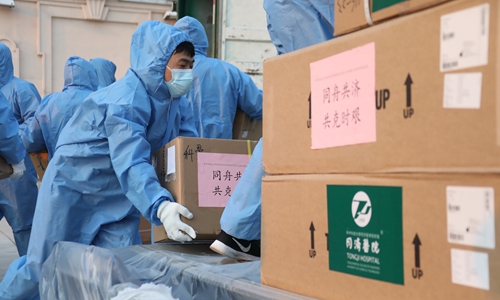Manzhouli tightens land ports after virus strain found similar to that in Russia
Source: Global Times Published: 2020/11/30 16:11:25

Workers unload medical supplies from hospitals in Wuhan in Manzhouli, North China's Inner Mongolia Autonomous Region, for the fight against the novel coronavirus in the China-Russia border city on Friday. Photo: Xinhua
As Manzhouli, China's largest land port in North China's Inner Mongolia Autonomous Region, rolls out the second round of nucleic acid tests after detecting a virus strain similar to that in Russia, the port city called for tighter restrictions on highway and railway ports along the Chinese border to curb risks brought by imported cases.
The highway and railway port areas of Manzhouli will be strictly managed, and no one will be allowed to enter the highway and railway area or Senfu logistics park except for work reasons, the local government announced Monday. The Senfu logistics park is an industrial plant complex near the border.
It said that the Manzhouli railway port has prohibited the import of goods in bags that weigh 50 kilograms or less or that require manual loading operations. Only bulk imports of agricultural products will be allowed.
Previously, local health authorities had said the genetic sequence of the two COVID-19 patients first reported in Manzhouli belongs to the L genotype of the European branch, and shares a high similarity with the strain found in Russia.
The city reported a total of 11 locally transmitted cases but the city had yet to release the source of infection as of press time.
In a bid to accurately screen potential patients carrying the virus and cut off the transmission route, the port city is rolling out a second round of tests among some 200,000 citizens. As of Monday morning, a total of 203,378 people had been tested and 19,100 people had received results.
The four nucleic acid testing laboratories in the city have comprehensively improved their testing capacity, and other laboratories in Hulunbuir have provided support at the same time, greatly improving the efficiency of the massive citywide testing. All tests are expected to be completed by Monday, the local government said.
To prevent the imported cases from infecting local residents, police have been busy checking all vehicles and people entering Manzhouli port from Russia. All arriving Russian travelers and their vehicles will be sent to hotels in the local Senfu Logistics Park for inspection, the publicity department of the Manzhouli public security bureau told the Global Times earlier.
The Global Times learned that as the port city deals with the outbreak, it is also escalating its management and supervision over imported cold-chain products. Local market regulators were mobilized to examine local seafood markets, cold-chain warehouses and cold-chain vans.
Railways, flights, and road traffic from Manzhouli have been halted, and medium-risk areas in the city have been put under strict traffic controls.
RELATED ARTICLES:
Posted in: SOCIETY